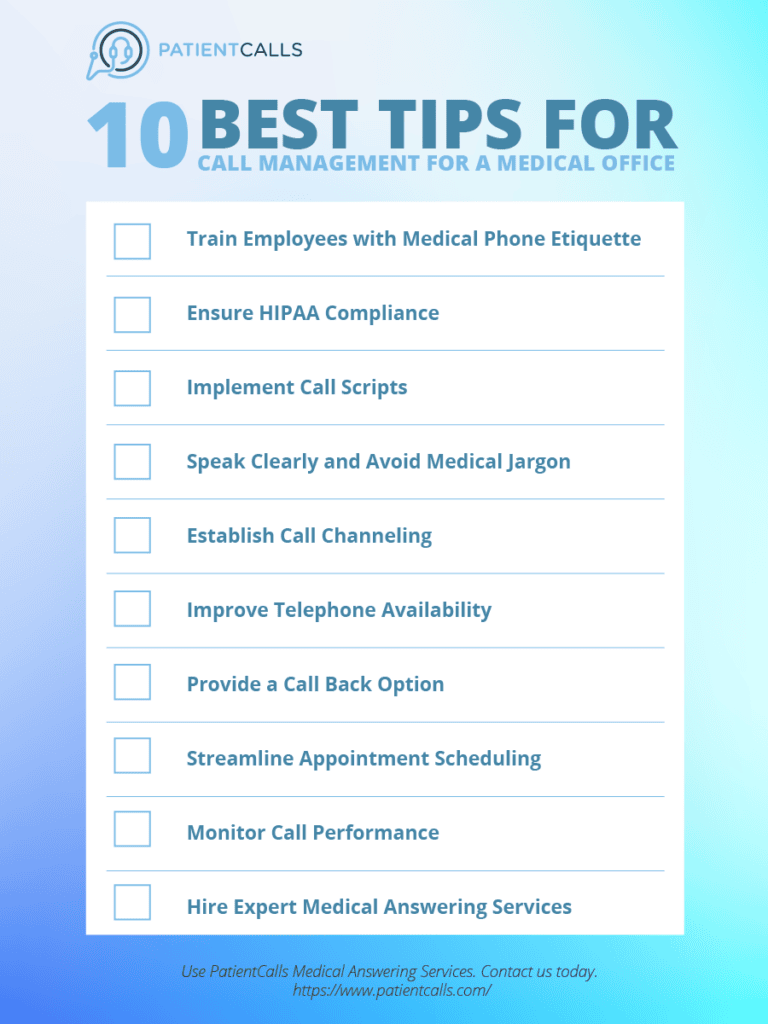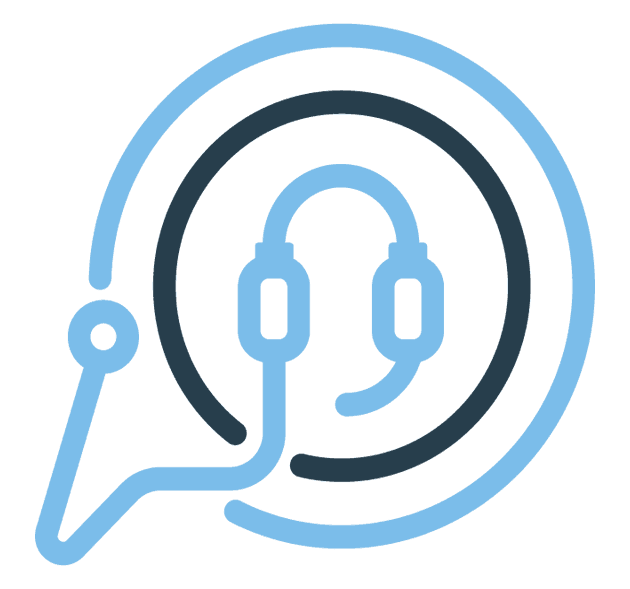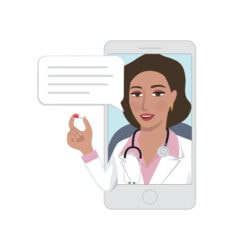Effective call management shows your medical office’s commitment to delivering quality medical service to patients. Calling is one of the many channels through which a patient can reach you. Through every call, you have an opportunity to address their concerns and promote your business.
Managing calls is a critical administrative task that requires skills and proper organization. Addressing patient concerns through the phone can be very different from communicating with them in person.
Learn how you can effectively manage calls and which skills you need to improve patient communication from this article.
Key Takeaways
1. Call management is a critical practice for medical offices that can help boost operational efficiency.
2. Some of the best call management practices include training, regulation compliance, improving availability using call scripts, speaking clearly and professionally, and using medical answering services.
3. PatientCalls’ Medical Answering Services can fully take care of and streamline call management for your business.
10 Best Call Management Tips for Medical Offices
Calling a medical office is one of the most efficient ways a patient can access your services. It is a part of the critical administrative tasks. This means that receiving these calls and properly addressing them can either mean business for your medical office or the other way around.
Call management involves multiple layers of training, security, and customer service. Combined and streamlined, your medical office can achieve more and gain more credibility with patients.
Below, we’ve rounded up the 10 best tips for call management for a medical office.

Train Employees with Medical Phone Etiquette
Effective communication is critical for answering calls in a medical office. Medical receptionists must practice professionalism, empathy, and active listening to gain the patient’s trust and business.
Every employee must be properly trained on how to address different types of situations, such as handling emergency calls or redirecting calls to their proper channels. Provide extensive call management training to staff to help them create an attentive environment for the patient’s cause.
Ensure HIPAA Compliance
Compliance with HIPAA regulations is a must for any business transacting in healthcare. It aims to protect patient information and preserve confidentiality. It is always important for receptionists to ensure patients that their information is secured.
Ensure all staff members are well-versed in HIPAA guidelines and understand the importance of safeguarding patient privacy during phone interactions. Implement protocols for securely handling and disclosing sensitive medical information.
Implement Call Scripts
While personalizing every response is a great way to get the patient’s trust, it just cannot be done for every single patient. As such, build hospitable scripts that clearly detail your medical office’s information and your services.
Having a prepared script also helps your staff to remain calm in taking the patient’s concerns. They also help properly guide the patients to the right department for their concerns.
Speak Clearly and Avoid Medical Jargon
A great trait of a medical receptionist is their ability to make the patient feel comfortable and heard, which is a critical task when the patient is in distress. To help with this, receptionists must speak clearly and avoid terminologies that can complicate or confuse the patient.
Use clear and simple language to ensure understanding, especially when explaining medical procedures or instructions. The faster and clearer you get to the point and address the concern, the better.
Establish Call Channeling
Channeling refers to having multiple phone lines for different concerns, such as billing, appointment scheduling, pharmacy, and others. This management technique is a great way to divide the tasks and improve patient flow management in your medical office.
Call channeling also reduces waiting time for patients. The key thing here is to keep the channels simple and not too complex to maintain the patient’s interest in your services.
Improve Telephone Availability
Ensure that your medical office has sufficient staff and resources to handle incoming calls promptly. Avoid long hold times or busy signals by optimizing staffing levels and implementing call management strategies to improve telephone availability.
Answering the phone at the right time may save a patient’s life. In addition, some patients cannot call during regular working hours because of work conflicts. As such, consider opening after-hours answering services.
Provide a Call Back Option
Implementing a call-back option is a great way for your medical office to show patients that you care for them and want to attend to them as soon as possible. A call-back option is a great way to reduce pressure on medical receptionists and allows them to organize their time better.
Offer patients the option to request a call back if they are unable to reach a staff member immediately. This helps reduce wait times and allows patients to attend to other matters while waiting for assistance.
Streamline Appointment Scheduling
Scheduling appointments takes so much time out of a receptionist’s schedule. This task requires interviewing the patient to know the urgency of their concern and looking for a suitable schedule for patient visits.
You can help your team by establishing a do-it-yourself appointment scheduling system through software solutions. This type of tool allows patients to find a suitable time for them and help reduce no-shows. This is also a great tool for supporting your medical receptionists and healthcare providers. Another effective way is to outsource appointment scheduling.
Monitor Call Performance
Regularly monitor call performance metrics such as call volume, average wait times, call resolution rates, and patient satisfaction scores. Use this data as key performance indicators to identify trends, pinpoint areas for improvement, and implement targeted strategies to enhance call management processes.
This step can help you identify important points, such as the highest call traffic time, and help you manage the receptionist’s hours.
Hire Expert Medical Answering Services
Consider outsourcing your medical office’s call management to expert medical answering services. These services specialize in handling medical inquiries, appointment scheduling, medical records, and emergency calls and providing professional and efficient assistance to patients while ensuring HIPAA compliance.
Use PatientCalls’ medical answering services. Our team can help you streamline call management and handle patient interviews even after hours. What makes our services even better is all of our staff are trained in HIPAA compliance.
Why Is Medical Practice Call Management Important?
Effective and proper call management for medical offices is significant for a smooth operation. It allows medical offices to handle patient inquiries and concerns properly and promote the medical office’s brand and services.
Call management also helps medical offices boost operational efficiency and handle patient traffic better. It is critical for successful medical practice management and patient care.
Timely access to medical services, especially in emergencies, can significantly impact patient outcomes, making it crucial for offices to establish efficient call-handling procedures that prioritize urgent matters and ensure quick response times.
What Is the Phone Etiquette for Medical Offices?
Proper phone etiquette for medical offices shows how your business values your patients. The way your receptionist receives patients can impact whether they will continue availing of your services or not.
Every medical office must train their receptionists on proper phone etiquette. Follow these steps to help you address customer concerns better:
- Be courteous and professional. Greet the patient with a lively yet professional tone.
- Introduce your medical office immediately. This helps the patient identify that they are calling the right number.
- Talk with much empathy and understanding. Most patients calling your office may be suffering from unknown conditions, so practice showing concern.
- Practice the highest confidentiality and reassure the patient.
- If you are to put a patient on hold, explain why.
- Always provide an approximate time for a call-back and try to stay true to the estimate.
- Avoid using medical jargon that may confuse or intimidate the patient.
- Be proactive in solving the patient’s concerns. Direct the patient to the proper channel properly.
- As much as possible, try to answer the patient’s phone calls promptly. Use the help of medical answering services to improve pickup rates.
- Always end the call on a positive note and thank the patient. Ensure that the main concern is resolved.
Phone etiquette may vary depending on different situations. The main key is for you to remain professional and maintain confidentiality. Effective communication is important in maintaining business and resolving patient concerns.

Critical Call Management Skills Every Medical Answering Service Should Have
There are different levels of call management. Each level requires skills for proper execution.
Critical call management skills are essential for medical answering services to effectively handle inquiries, prioritize urgent matters, and provide assistance to patients.
Some of the call management skills that a medical answering service should have include:
- Comprehensive knowledge of company services. While not necessarily a skill, this aspect is critical for call management. Patients expect you to direct them to the correct services. Understanding the services you offer speeds up the call process and allows you to help the patient get the attention they need efficiently. Medical answering services should also at least know beginner-level medical terms and related laws to ensure clear and precise communication.
- Efficient communication. This skill combines active listening, proficiency in language, comprehension of medical situations, and clear translation of information. This skill is critical in accommodating patients in a medical office.
- Empathy. Displaying empathy and compassion towards callers, especially those who may be experiencing medical emergencies or distress, is vital for providing effective support and reassurance. Medical answering service staff should validate callers’ concerns and offer comfort and support as needed.
- Patience and Calmness. Medical answering service representatives must have a very long patience and be able to maintain calmness. Some situations will require this to console distressed patients and efficiently acquire the needed information.
- Critical thinking. This is important for handling unexpected situations and emergencies. They should be able to assess the urgency of calls, make quick decisions, and take appropriate actions to ensure timely and appropriate responses.
While these skills must be inherently present in a medical answering representative, they can be trained and honed. Medical offices must hold regular training sessions for receptionists to evaluate areas for improvement and adapt efficiently.
Manage Calls Efficiently With the Help of PatientCalls
Efficient call management is paramount for the smooth operation of any medical practice. Missed calls or mishandled inquiries can lead to patient dissatisfaction and missed appointments and ultimately impact the quality of care provided.
PatientCalls’ medical answering services offer a comprehensive solution to this challenge. With our round-the-clock availability and highly trained operators, we ensure that every call is handled promptly and professionally. Whether it’s scheduling appointments, forwarding urgent messages, or providing essential information, our HIPAA-compliant services and receptionists are dedicated to delivering exceptional service that reflects positively on your practice.
Call us today and schedule a demonstration to understand our services further.







